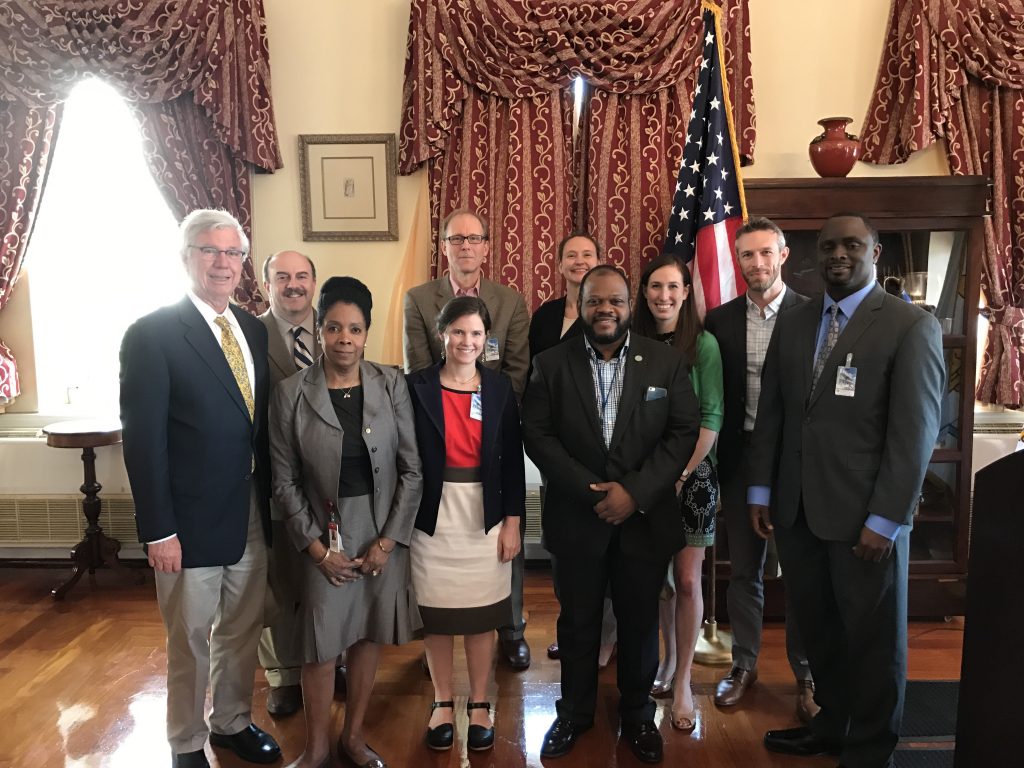On Feb. 15-16, 2017, Coastal Resilience Center of Excellence (CRC) Director Dr. Gavin Smith was among a group of national experts on climate adaptation and resilience brought to the

Participants at a two-day workshop on preparing for earthquakes, flooding, sea-level rise and other hazards U.S. Virgin Islands was organized by the Governors’ Institute on Community Design and included members of the U.S. Virgin Islands Climate Change Council and other stakeholders.
Photo by Dr. Wayne Archibald.
U.S. Virgin Islands for a two-day workshop on preparing for earthquakes, flooding, sea-level rise and other hazards. The two-day workshop, which was organized by the Governors’ Institute on Community Design (GICD), included members of the U.S. Virgin Islands Climate Change Council and other stakeholders.
During the workshop, participants heard presentations on how the Virgin Islands could become more resilient to hazards such as hurricanes and associated issues such as erosion and sea-level rise. Participants on the GICD team heard from the Council about the unique issues facing the Virgin Islands and community priorities.
The GICD is a national, nonpartisan program that assists governors in their efforts to support thriving, well-designed urban, suburban and rural communities. It has helped more than 30 state executive teams make choices to enhance communities through use of policy expertise, drawing from leading practitioners in fields such as land use, design, transportation, economic development, natural hazards resilience and regional planning.
Virgin Islands Gov. Kenneth Mapp issued an executive order on climate change in 2015, and has been working to develop a resiliency plan that can guide policy in the face of a changing climate.
The first day of the workshop focused on exploring different strategies for reducing risk and building long-term resilience. The second day involved presenting proposed recommendations to members of the Climate Change Council. The recommendations included:
- Developing a “resilience vision” for the Virgin Islands and assessing existing capacity, including evaluating proposed projects or policies for resilience, risk reduction, emissions impact or social justice implications.
- Altering the hazard mitigation planning process to include climate change strategies, proactive land management, scenario planning and incorporating adaptation into disaster recovery.
- Educating the public on the hazards of extreme weather and climate change through local schools and universities, youth programs, government websites and existing health and wellness programs.
- Expanding the disaster recovery process to include climate change planning, while ensuring that citizens are not overburdened by new codes and standards.
- Investigating federal funds that allow existing programs and budgets to serve as match funding, and aligning objectives across agencies to qualify for those funds.
“Drawing lessons from success stories and challenges across a wide range of communities is key to improving resilience to hazards,” Dr. Smith said. “This workshop was a unique opportunity to work with a great team and gain an appreciation of the U.S. Virgin Islands’ unique concerns. Based on this understanding, we sought to help them create a larger vision going forward and operationalize this vision with a set of achievable actions.”
For more information on the GICD, visit govinstitute.org.